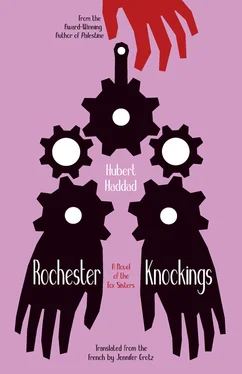Elisha Kane’s farewells on the eve of his departure on an express train to the port of New York filled Margaret with apprehension, but she had the perspicacity not to let on about these forebodings, knowing that he would only see them as a hardly promising symptom of irrationalism. Aboard the expeditionary ship, along the inhabited shores, Elisha did not fail however to write long letters posted at each stop to his sweet and disciplined promised one.
Grinnell’s second expedition would fail to further explain the endpoint of John Franklin’s arctic line, but because of it, the whole North coast could be mapped up to a latitude of 82º2’3. At the risk of being trapped by walls of ice that, barely broken up, would close back up right behind their ship, and suffering from scurvy and malnutrition, Kane and his crew heroically crossed Smith Sound to the ice floes of the then-unnamed Cape Constitution. Nearly a year without news after the rare missives that had come from the Atlantic shores of Canada, Margaret rebelled against her superstitious nature, vowing to forget the spirit-chasing devil if Elisha came back safe and sound. Saved in extremis from the grip of ice by a British bomb vessel with a steel rostrum, the explorer indeed reappeared with an almost-intact crew.
He returned home safe to Philadelphia, burning with tragic and sumptuous recollections that he started to transcribe with a sort of dazzled haste, but his health declined quickly after their wedding. Although tolerated by her in-laws after this test of interminable waiting, Margaret, who had only her husband’s financial support to count on, had to defend tooth and nail her assets as woman and spouse. Without any regard for the love she had bore for him, they sought every means to take over her duty to care for her sick husband under the pretext that she lacked the experience and quality of judgment assumed proper by the cream of society. Margaret drank deep draughts of the waves of fever that intermittently struck her companion. Vestal virgin over his breath, she watched for each sign of weakening and at night stood awake beside his burning flesh with the feeling of drowning.
As soon as he was better, before the inevitable relapse, Kane gave himself over with no qualms to the obligations of a finally achieved celebrity, even accepting honors and distinctions with a sort of exasperated appetite, all the while meditating on new odysseys. He didn’t think twice about crossing the Atlantic to give an account of his expedition to Sir John Franklin’s widow. Back from London, taken again by illness, he yielded to the entreaties of his doctor who promised him restored health in the Caribbean. The trip undertaken this time on a three-masted frigate of the United States Navy, Margaret was surrounded for three days straight by a terrible sea of steel that swung its giant scythe as high as the masts.
In Havana, at the loading dock, Elisha looked almost joyful under the glare of the sun, which the royal palm trees barely shaded. But the spectacle of a long column of chained slaves led to the harbor by armed militia quickly broke his enthusiasm. The young couple had time to enjoy the privilege of island life and knew some beautiful days. But the too-intense light seemed to reduce him little by little. The local doctors recommended a more temperate climate for Kane; however, the return trip would have to wait for a remission. Instead, death’s access had been increased.
Out of sorts, mouth dry, Elisha turned to his wife one night to recite one of the poems he’d written for her with edifying ends:
Weary! weary is the life
By cold deceit oppressed
Margaret heard nothing but a groan and, waking instantly, found him dead by her side.
XIV.And Now We Roam in Sovreign Woods
It was while going down Norton Street headed toward the lake and river that William Pill, at a slow trot on his Quarter Horse, recognized the youngest of the Fox sisters in the back of a carriage loaded with three beautiful leather trunks with gold hardware. He immediately turned around to accompany the car. Accustomed to troublemakers, the young woman mimicked indifference.
“You don’t remember me, Miss Kate? Yet it seems to me that I was of some help to you during a night of rioting in Hydesville. .”
She stared frankly at the rider, surprised to see that beautiful, cheerful, all-pockmarked face.
“I’ll never forget how you saved us from hanging, you and Miss Pearl. .”
“Are you leaving Rochester?” he asked, nodding toward the luggage.
“I’m taking the train to New York in half an hour.”
“Well, good luck!” he said. “Maybe we’ll cross paths there someday? They say there’s fortune over there to be plucked like clover on a battlefield.”
Turning back around, Pill thought that there was surely room enough in New York for one more swindler. Soon he heard the great wooden bridge resound as the locomotive squealed. The mention of Pearl — he couldn’t lie to himself — had affected him rather strongly. That woman carried in her every blessing and every perdition. Once again he had tried to forget her after their surprising reunion, which had certainly been a surprise only to him.
Galloping this time toward Lake Shore Boulevard, he remembered in two parallel streams of reverie the vagaries of his career as conjurer and of the incomprehensible success of his new livelihood. At poker or roulette, Lady Luck was linked as much to bluffing as the little fetishistic rituals and would almost certainly elude him once he put faith in her star; but in front of a public gaping at ghosts, every turn was good for filling his wallet. Once the illusion had reached its height, he would be overwhelmed by unexpected phenomena, some kind of uncontrollable fantasy, as if hoaxing the most unsuspecting hearts and consciences sometimes provoked, quite surreptitiously, the repercussions of something supernatural. It was fashionable to assert the nonexistence of chance, that thing concealing a necessity that would answer to higher laws. With their genius for competition, the mediums coming from Europe also claimed that there was no hell, suffering cannot be unpardonable, and that our lives were all subject to reincarnation. So that the present life would come after innumerable others, always revolving, and all of this in order to atone for this exhausting relay of crimes and transgressions that have dragged on since the expulsion from Eden and will go on into the future, ending with incalculable and successive human husks falling one after the other into the dust, perfectly immaculate in the light of God. It amused him, these hobbyhorses of false pastors. He adapted them to his purpose by promising better lives tailor-made: so and so, who toils at boiling wool, will be the son of the governor in the next life, and the old leprous woman pouring with sweat after walking from the hospice will be reborn princess of Grenada or Norway. But metempsychosis didn’t help much with the everyday.
On the shores of Lake Ontario, at this cool morning hour, he set out on his Quarter Horse so quick to pick up speed, holding the reins with one hand and his hat with the other, happy to see her dancing mane the color of beer and blonde tobacco. A cigarillo added its smoke to the low-hanging fog. He told himself that the episode with the blind man and his female guide, dating back now already several months, would have remained suspended in the realm of the absurd, its insane images digging their spurs in his side. For a long time, incomprehensible, it remained inscribed in him, like a living tattoo on the skin of his dreams. .
One evening last winter, under the unoriginal name of Mac Orpheus, he had agreed to go to this curious solicitor’s home for a private séance at a reasonable price, on the west bank, downstream from the Great Falls. The same young, short-haired blonde woman greeted him at the door of a big sad house in the Rochester suburb. The darkness inside was carved hollow by the light of an occasional candle. Apart from some bituminous paintings on the walls, heavy drapes and rosewood screens, the room where they received him was furnished only with a round table and three chairs. He presented himself with a peddler’s bag containing his basic equipment, his planchette rolling board, an alphabet, some scarves, magnets, a tarot deck, two boxes filled with painted glass plates, a lantern with swiveling magnifying glasses and his precious fumigator scented with pontifical incense. Only after he was settled behind the table did he notice that he was in the presence of the old man, seated several meters away in a dark corner, a leather briefcase on his knees. He was also able to perceive that the young woman now acting as governess was wearing a very flattering though out-of-fashion dress. Dimly lit since greeting him at the doorway, her beauty finally flowered in the candle’s flame. He was stunned once again by a panicked feeling of déjà-vu. At that moment the blind man handed him a photographic plate, face-up. “It’s about this person,” he murmured in a slightly quavering voice. It was a calotype, that method of chemically capturing light invented by Talbot two decades earlier, which showed the portrait of a gracious Puritan woman of not long ago, a white shadow in her faded eyes. The blind man was pressed all the way back in his seat. Behind him his alleged housekeeper, backed by the heavy curtains at the window, motionlessly observed the scene with an absent expression on her face, as if she herself were posing for some cameraman hostile to the least blink. As usual, Pill started out with his huckster hermeneutic of proven clichés before testing out his “rigorously scientific operating technique.” The first raps that he produced from the table, his hands in the air, neither the blind man nor the young woman appeared to have heard. But the lugubrious atmosphere filled with incense fumes was favorable for apparitions. From his improvised medium’s cabinet, he began to project by means of his lantern and his fumigator a materialization in good and due form between the panel of a screen and the angle of a wall. The woman’s silhouette that took shape, moving, on the broth of white smoke, made no impression, as he had expected it to, on his only female spectator, and consequently she remained silent for the blind man. Frustrated by this lack of cooperation, he was resolutely determined, without any more unnecessary effects, to render audible any kind of manifestation coming from anywhere whatsoever. And so he pretended to focus like a paid oracle on the calotype, after inquiring from the old man what he really wanted to know. He quickly lost control of the situation at the moment of the alphabetic transcription of knocks. “Violet! Violet!” the blind man cried out. “I beg you to answer me this time! Was it an accident, was it an accidental drowning?” This pathetic exhortation ended with a groan. Taken ill, the old man suddenly doubled over and toppled head first onto the leather suitcase. The other woman left her prostration, and rushing over, very pale, she began to drag the panting body away from the table and smoke.
Читать дальше












